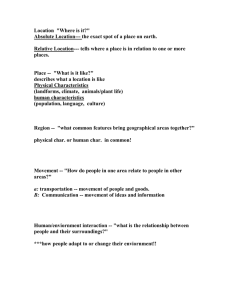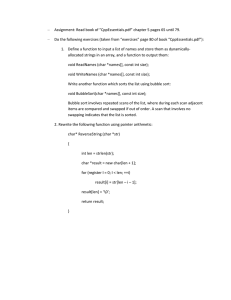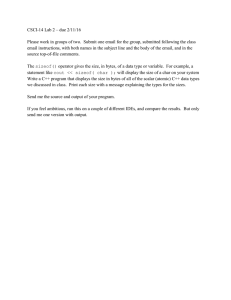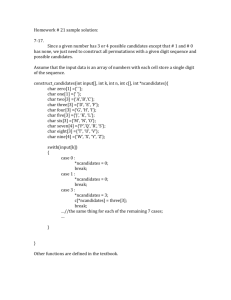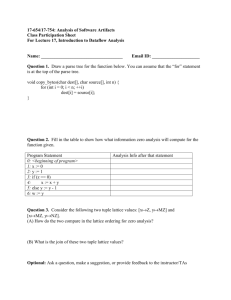Portability
advertisement
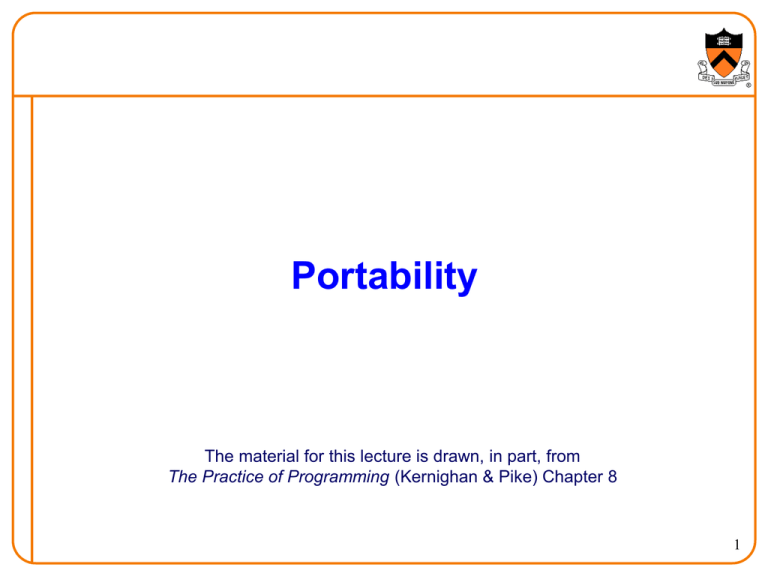
Portability
The material for this lecture is drawn, in part, from
The Practice of Programming (Kernighan & Pike) Chapter 8
1
Goals of this Lecture
• Help you learn how to:
• Write portable C code ‒ code that works with multiple:
Hardware platforms
Operating systems
Compilers
Human cultures
• Why?
• Moving existing code to a new context is easier/cheaper
than writing new code for the new context
• Code that is portable is (by definition) easier to move;
portability reduces software costs
• Relative to other high-level languages (e.g. Java), C is
notoriously non-portable
• A power programmer knows techniques for writing
portable C code
2
The Real World is Heterogeneous
• Multiple kinds of hardware
• 32-bit Intel Architecture
• 64-bit IA, PowerPC, Sparc, MIPS, Arms, …
• Multiple operating systems
• Linux
• Windows, Mac, Sun, AIX, …
• Multiple character sets
• ASCII
• Latin-1, Unicode, …
• Multiple human alphabets and languages
3
Portability
• Goal: Run program on any system
• No modifications to source code required
• Program continues to perform correctly
Ideally, the program performs well too
4
C Portability
• C is notoriously non-portable
• Why?
• Recall C design goals…
Create the Unix operating system and associated software
Reasonably “high level”, but…
Close to the hardware for efficiency
• So C90 is underspecified
Compiler designer has freedom to reflect the design of the
underlying hardware
• But hardware systems differ!
So C compilers differ
• Extra care is required to write portable C code
5
General Heuristics
Some general portability heuristics…
6
Intersection
(1) Program to the intersection
• Use only features that are common to all target
environments
• I.e., program to the intersection of features, not the
union
• When that’s not possible…
7
Encapsulation
(2) Encapsulate
• Localize and encapsulate features that are not in the
intersection
• Use parallel source code files -- so non-intersection
code can be chosen at link-time
• Use parallel data files – so non-intersection data (e.g.
textual messages) can be chosen at run-time
• When that’s not possible, as a last resort…
8
Conditional Compilation
(3) Use conditional compilation
#ifdef __UNIX__
/* Unix-specific code */
#endif
…
#ifdef __WINDOWS__
/* MS Windows-specific code */
#endif
…
• And above all…
9
Test!!!
(4) Test the program with multiple:
•
•
•
•
Hardware (Intel, MIPS, SPARC, …)
Operating systems (Linux, Solaris, MS Windows, …)
Compilers (GNU, MS Visual Studio, …)
Cultures (United States, Europe, Asia, …)
10
Hardware Differences
• Some hardware differences, and
corresponding portability heuristics…
11
Natural Word Size
• Obstacle: Natural word size
• In some systems, natural word size is 4 bytes
• In some (esp. older) systems, natural word size is 2
bytes
• In some (esp. newer) systems, natural word size is 8
bytes
• C90 intentionally does not specify sizeof(int);
depends upon natural word size of underlying
hardware
12
Natural Word Size (cont.)
(5) Don’t assume data type sizes
• Not portable:
int *p;
…
p = malloc(4);
…
• Portable:
int *p;
…
p = malloc(sizeof(int));
…
13
Right Shift
• Obstacle: Right shift operation
• In some systems, right shift operation is logical
Right shift of a negative signed int fills with zeroes
• In some systems, right shift operation is arithmetic
Right shift of a negative signed int fills with ones
• C90 intentionally does not specify semantics of
right shift; depends upon right shift operator of
underlying hardware
14
Right Shift (cont.)
(6) Don’t right-shift signed ints
Not portable:
…
-3 >> 1
…
Logical shift => 2147483646
Arithmetic shift => -2
Portable:
…
/* Don't do that!!! */
…
15
Byte Order
• Obstacle: Byte order
• Some systems (e.g. Intel) use little endian byte order
Least significant byte of a
multi-byte entity is stored
at lowest memory address
The int 5 at address 1000:
1000
00000101
1001
00000000
1002
00000000
1003
00000000
• Some systems (e.g. SPARC) use big endian byte order
Most significant byte of a
multi-byte entity is stored
at lowest memory address
The int 5 at address 1000:
1000
00000000
1001
00000000
1002
00000000
1003
00000101
16
Byte Order (cont.)
(7) Don’t rely on byte order in code
• Not portable:
int i = 5;
char c;
…
c = *(char*)&i; /* Silly, but legal */
Little endian:
c=5
Big endian:
c = 0;
• Portable:
int i = 5;
char c;
…
/* Don't do that! Or... */
c = (char)i;
17
Byte Order (cont.)
(8) Use text for data exchange
fwrite()writes
raw data to a file
• Not portable:
Run on a little
endian computer
unsigned short s = 5;
FILE *f = fopen("myfile", "w");
fwrite(&s, sizeof(unsigned short), 1, f);
myfile
Run on a big
endian computer:
Reads 1280!!!
00000101 00000000
fread() reads
raw data from a file
unsigned short s;
FILE *f = fopen("myfile", "r");
fread(&s, sizeof(unsigned short), 1, f);
18
Byte Order (cont.)
• Portable:
Run on a big or
little endian
computer
fprintf() converts
raw data to ASCII text
unsigned short s = 5;
FILE *f = fopen("myfile", "w");
fprintf(f, "%hu", s);
myfile
Run on a big or
little endian
computer:
Reads 5
00110101
ASCII code for ‘5’
fscanf()reads ASCII
text and converts to
raw data
unsigned short s;
FILE *f = fopen("myfile", "r");
fscanf(f, "%hu", &s);
19
Byte Order (cont.)
If you must exchange raw data…
(9) Write and read one byte at a time
Run on a big or
little endian
computer
unsigned short s = 5;
FILE *f = fopen("myfile", "w");
fputc(s >> 8, f);
/* high-order byte */
fputc(s & 0xFF, f); /* low-order byte */
Decide on
big-endian data
exchange format
Run on a big or
little endian
computer:
Reads 5
myfile
00000000 00000101
unsigned short s;
FILE *f = fopen("myfile", "r");
s = fgetc(f) << 8;
/* high-order byte */
s |= fgetc(f) & 0xFF; /* low-order byte */
20
OS Differences
• Some operating system differences,
and corresponding portability
heuristics…
21
End-of-Line Characters
• Obstacle: Representation of “end-of-line”
• Unix (including Mac OS/X) represents end-of-line as 1
byte: 00001010 (binary)
• Mac OS/9 represents end-of-line as 1 byte: 00001101
(binary)
• MS Windows represents end-of-line as 2 bytes:
00001101 00001010 (binary)
22
End-of-Line Characters (cont.)
(10) Use binary mode for textual data exchange
• Not portable:
FILE *f = fopen("myfile", "w");
fputc('\n', f);
Run on Unix
00001010
\n
Open the file
in ordinary
text mode
Run on Mac OS/9 Run on MS Windows
00001101
\r
00001101 00001010
\r
\n
Trouble if read via fgetc() on “wrong” operating system
23
End-of-Line Characters (cont.)
• Portable:
Open the file
in binary mode
FILE *f = fopen("myfile", "wb");
fputc('\n', f);
Run on Unix,
Mac OS/9, or
MS Windows
00001010
\n
No problem if read via fgetc() in binary mode on “wrong”
operating system
I.e., there is no “wrong” operating system!
24
Data Alignment
• Obstacle: Data alignment
• Some hardware requires data to be aligned on particular boundaries
• Some operating systems impose additional constraints:
OS
char short int double
Linux
1
2
4
4
MS Windows
1
2
4
8
Start address must be evenly divisible by:
• Moreover…
• If a structure must begin on an x-byte boundary, then it also must
end on an x-byte boundary
Implication: Some structures must contain padding
25
Data Alignment (cont.)
(11) Don’t rely on data alignment
• Not portable:
Allocates 12 bytes;
too few bytes on
MS Windows
struct S {
int i;
double d;
}
…
struct S *p;
…
p = (struct S*)malloc(sizeof(int)+sizeof(double));
Windows:
i
pad
d
Linux:
i
d
26
Data Alignment (cont.)
• Portable:
Allocates
• 12 bytes on Linux
• 16 bytes on MS Windows
struct S {
int i;
double d;
}
…
struct S *p;
…
p = (struct S*)malloc(sizeof(struct S));
Windows:
i
pad
d
Linux:
i
d
27
Character Codes
• Obstacle: Character codes
• Some operating systems (e.g. IBM OS/390) use the
EBCDIC character code
• Some systems (e.g. Unix, MS Windows) use the ASCII
character code
28
Character Codes (cont.)
(12) Don’t assume ASCII
• Not portable:
Assumes ASCII
if ((c >= 65) && (c <= 90)) …
• A little better:
if ((c >= 'A') && (c <= 'Z')) …
• Portable:
#include <ctype.h>
…
if (isupper(c)) …
Assumes that
uppercase char
codes are
contiguous; not
true in EBCDIC
For ASCII:
(c >= 'A') && (c <= 'Z')
For EBCDIC:
((c >= 'A') && (c <= 'I'))
|| ((c >= 'J') && (c <= 'R'))
|| ((c >= 'S') && (c <= 'Z'))
29
Compiler Differences
• Compilers may differ because they:
• Implement underspecified features of the C90 standard
in different ways, or
• Extend the C90 standard
• Some compiler differences, and
corresponding portability heuristics…
30
Compiler Extensions
• Obstacle: Non-standard extensions
• Some compilers offer non-standard extensions
31
Compiler Extensions
(13) Stick to the standard language
• For now, stick to C90 (not C99)
• Not portable:
…
for (int i = 0; i < 10; i++)
…
Many systems allow
definition of loop control
variable within for
statement, but a C90
compiler reports error
• Portable:
int i;
…
for (i = 0; i < 10; i++)
…
32
Evaluation Order
• Obstacle: Evaluation order
• C90 specifies that side effects and function calls must be
completed at “;”
• But multiple side effects within the same expression can
have unpredictable results
33
Evaluation Order (cont.)
(14) Don’t assume order of evaluation
• Not portable:
strings[i] = names[++i];
i is incremented before
indexing names; but has i
been incremented before
indexing strings?
C90 doesn’t say
• Portable (either of these, as intended):
i++;
strings[i] = names[i];
strings[i] = names[i+1];
i++;
34
Evaluation Order (cont.)
• Not portable:
Which call of getchar()
is executed first? C90
doesn’t say
printf("%c %c\n", getchar(), getchar());
• Portable (either of these, as intended):
i = getchar();
j = getchar();
printf("%c %c\n", i, j);
i = getchar();
j = getchar();
printf("%c %c\n", j, i);
35
Char Signedness
• Obstacle: Char signedness
• C90 does not specify signedness of char
• On some systems, char means signed char
• On other systems, char means unsigned char
36
Char Signedness (cont.)
(15) Don’t assume signedness of char
• If necessary, specify “signed char” or “unsigned char”
• Not portable:
int a[256];
char c;
c = (char)255;
…
… a[c] …
If char is unsigned, then a[c] is a[255]
=> fine
If char is signed, then a[c] is a[-1]
=> out of bounds
• Portable:
int a[256];
unsigned char c;
c = 255;
…
… a[c] …
37
Char Signedness (cont.)
• Not portable:
If char is unsigned, then
this always is FALSE
int i;
char s[MAX+1];
for (i = 0; i < MAX; i++)
if ((s[i] = getchar()) == '\n') || (s[i] == EOF))
break;
s[i] = ‘\0’;
• Portable:
int c, i;
char s[MAX+1];
for (i = 0; i < MAX; i++) {
if ((c = getchar()) == '\n') || (c == EOF))
break;
s[i] = c;
}
s[i] = ‘\0’;
38
Library Differences
• Some library differences, and
corresponding portability heuristics…
39
Library Extensions
• Obstacle: Non-standard functions
• “Standard” libraries bundled with some development
environments (e.g. GNU, MS Visual Studio) offer nonstandard functions
40
Library Extensions
(16) Stick to the standard library functions
• For now, stick to the C90 standard library functions
• Not portable:
char *s = "hello";
char *copy;
…
copy = strdup(s);
…
strdup() is available in
many “standard” libraries,
but is not defined in C90
• Portable:
char *s = "hello";
char *copy;
…
copy = (char*)malloc(strlen(s) + 1);
strcpy(copy, s);
…
41
Cultural Differences
• Some cultural differences, and
corresponding portability heuristics…
42
Character Code Size
• Obstacle: Character code size
• United States
Alphabet requires 7 bits => 1 byte per character
Popular character code: ASCII
• Western Europe
Alphabets require 8 bits => 1 byte per character
Popular character code: Latin-1
• China, Japan, Korea, etc.
Alphabets require 16 bits => 2 bytes per character
Popular character code: Unicode
43
Character Code Size
(17) Don’t assume 1-byte character code size
• Not portable:
char c = 'a';
• Portable:
C90 has no good solution
C99 has “wide character” data type, constants, and associated
functions
#include <stddef.h>
…
wchar_t c = L'\x3B1'; /* Greek lower case alpha */
But then beware of byte-order portability problems!
Future is not promising
44
Human Language
• Obstacle: Humans speak different natural
languages!
45
Human Language (cont.)
(18) Don’t assume English
• Not portable:
/* somefile.c */
…
printf("Bad input");
…
• Can’t avoid natural language! So…
46
Human Language (cont.)
/* somefile.c */
#include "messages.h"
…
printf(getMsg(5));
…
Choose appropriate
“message.c” file at
link-time
Messages module,
with multiple implementations
• Encapsulate code
/* messages.h */
char *getMsg(int msgNum);
/* englishmessages.c */
char *getMsg(int msgNum) {
switch(msgNum) {
…
case 5:
return "Bad input";
…
}
}
/* spanishmessages.c */
char *getMsg(int msgNum) {
switch(msgNum) {
…
case 5:
return "Mala entrada";
…
}
}
47
Human Language (cont.)
• Maybe even better: encapsulate data
Messages module
/* messages.h */
char *getMsg(int msgNum);
/* messages.c */
/* englishmessages.txt */
enum {MSG_COUNT = 100};
char *getMsg(int msgNum) {
static char *msg[MSG_COUNT];
static int firstCall = 1;
if (firstCall) {
<Read all messages from
appropriate messages.txt
file into msg>
firstCall = 0;
}
return msg[msgNum];
}
…
Bad input
…
/* spanishmessages.txt */
…
Mala entrada
…
Choose appropriate “message.txt” file at run-time
48
Summary
• General heuristics
(1) Program to the intersection
(2) Encapsulate
(3) Use conditional compilation (as a last resort)
(4) Test!!!
49
Summary (cont.)
• Heuristics related to hardware differences
(5) Don’t assume data type sizes
(6) Don’t right-shift signed ints
(7) Don’t rely on byte order in code
(8) Use text for data exchange
(9) Write and read 1 byte at a time
• Heuristics related to OS differences
(10) Use binary mode for textual data exchange
(11) Don’t rely on data alignment
(12) Don’t assume ASCII
50
Summary (cont.)
• Heuristics related to compiler differences
(13) Stick to the standard language
(14) Don’t assume evaluation order
(15) Don’t assume signedness of char
• Heuristic related to library differences
(16) Stick to the standard library
• Heuristics related to cultural differences
(17) Don’t assume 1-byte char code size
(18) Don’t assume English
51


